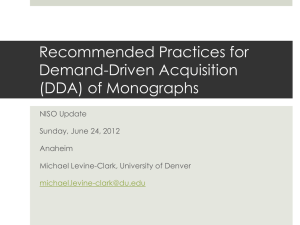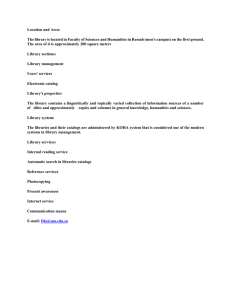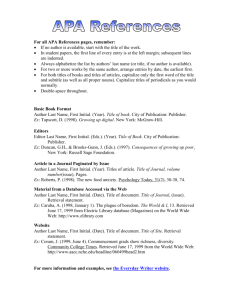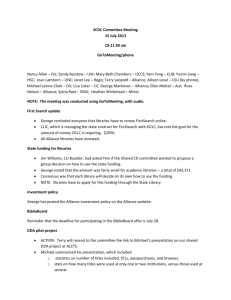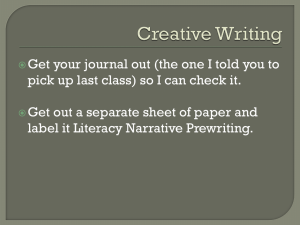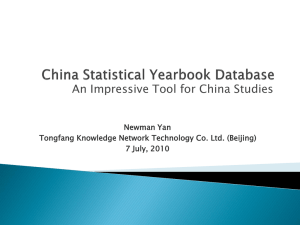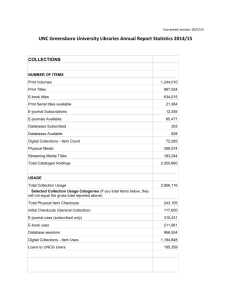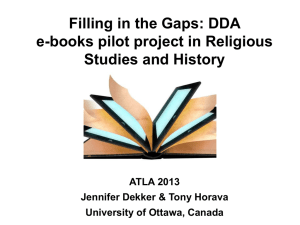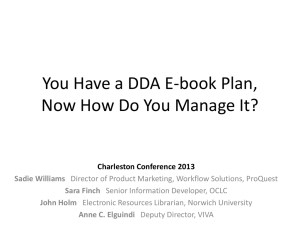Minutes September 27, 2011
advertisement
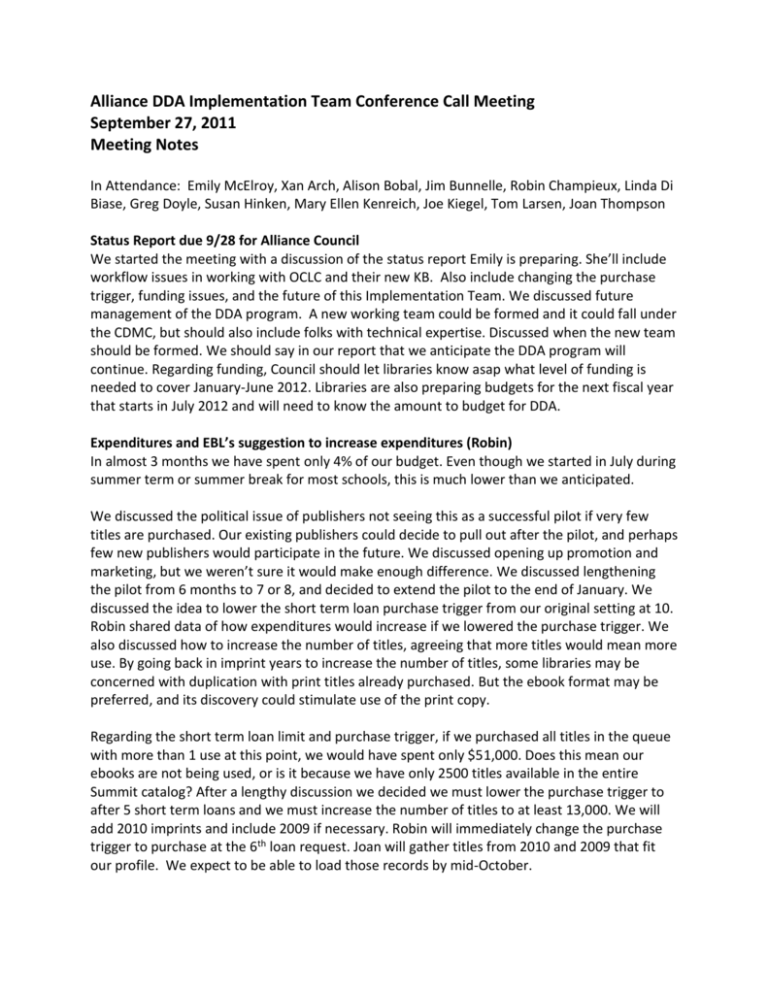
Alliance DDA Implementation Team Conference Call Meeting September 27, 2011 Meeting Notes In Attendance: Emily McElroy, Xan Arch, Alison Bobal, Jim Bunnelle, Robin Champieux, Linda Di Biase, Greg Doyle, Susan Hinken, Mary Ellen Kenreich, Joe Kiegel, Tom Larsen, Joan Thompson Status Report due 9/28 for Alliance Council We started the meeting with a discussion of the status report Emily is preparing. She’ll include workflow issues in working with OCLC and their new KB. Also include changing the purchase trigger, funding issues, and the future of this Implementation Team. We discussed future management of the DDA program. A new working team could be formed and it could fall under the CDMC, but should also include folks with technical expertise. Discussed when the new team should be formed. We should say in our report that we anticipate the DDA program will continue. Regarding funding, Council should let libraries know asap what level of funding is needed to cover January-June 2012. Libraries are also preparing budgets for the next fiscal year that starts in July 2012 and will need to know the amount to budget for DDA. Expenditures and EBL’s suggestion to increase expenditures (Robin) In almost 3 months we have spent only 4% of our budget. Even though we started in July during summer term or summer break for most schools, this is much lower than we anticipated. We discussed the political issue of publishers not seeing this as a successful pilot if very few titles are purchased. Our existing publishers could decide to pull out after the pilot, and perhaps few new publishers would participate in the future. We discussed opening up promotion and marketing, but we weren’t sure it would make enough difference. We discussed lengthening the pilot from 6 months to 7 or 8, and decided to extend the pilot to the end of January. We discussed the idea to lower the short term loan purchase trigger from our original setting at 10. Robin shared data of how expenditures would increase if we lowered the purchase trigger. We also discussed how to increase the number of titles, agreeing that more titles would mean more use. By going back in imprint years to increase the number of titles, some libraries may be concerned with duplication with print titles already purchased. But the ebook format may be preferred, and its discovery could stimulate use of the print copy. Regarding the short term loan limit and purchase trigger, if we purchased all titles in the queue with more than 1 use at this point, we would have spent only $51,000. Does this mean our ebooks are not being used, or is it because we have only 2500 titles available in the entire Summit catalog? After a lengthy discussion we decided we must lower the purchase trigger to after 5 short term loans and we must increase the number of titles to at least 13,000. We will add 2010 imprints and include 2009 if necessary. Robin will immediately change the purchase trigger to purchase at the 6th loan request. Joan will gather titles from 2010 and 2009 that fit our profile. We expect to be able to load those records by mid-October. Triangle Research Libraries Network Ebook Summit – Greg In August Greg attended the TRLN Ebook Summit for library consortia, publishers and vendors. Library consortia hold the principle that ownership means perpetual access, including loaning rights. The Summit discussion included access, sharing and temporary access. Publishers seem not to want to use the term InterLibrary Loan. But they would consider a “microcharge” for ILL. This may also be acceptable to libraries because ILL’ing print materials does cost in staff time and in borrowing fees. Libraries may be agreeable to paying a fee to simply provide access to an ebook. Other issues discussed at the Summit included acquisitions options and cost models. Link Resolver Button – Joe On the Summit catalog page for a DDA ebook, there is the link resolver button – “Find It @ Your Library.” Unfortunately, this link does not take the patron to the ebook. There is a smaller link below the “Find It @ Your Library” that takes you to the ebook, but it is much less obvious. The link resolver button can be turned off for ebooks by unclicking “all other electronic content” in the OCLC Service Configuration. This issue was pointed out to SPOT at the Summer Meeting. SPOT said they would investigate whether doing this would affect any other electronic content. We believe nothing has been done at this point and “Find It @ Your Library” still appears in the Summit catalog for these ebooks. Emily will recommend in the status report to Council that the button is turned off and we wait to hear from other libraries if it affects any other electronic content. Evaluation – Xan (and Linda) For our mid point evaluation we planned on presenting case studies, method documents, and a training survey. Linda prepared the training survey. Greg will put it on a survey tool and the link will be sent to the DDA Liaison list, asking that it be distributed to all who went to training. The survey will be attached to the email so responders can see the questions up front. Xan created a method for library self-assessment. Start with the amount your library contributed. Look at the usage stats for your library on the Alliance DDA website. Multiply the number of users by the average list price ($100.89) to determine the total list price of the content used. Divide the amount contributed by the total list price of the content used to determine the % of list price your library paid to facilitate access to content at your library. We discussed the case studies from Western Washington University and George Fox University using this assessment method. It was suggested that we prepare an assessment of each library, pulling data collected by Friday, October 14, to present at the November Council meeting. Xan and Linda will work on this. It would also be good if the background data could be placed in a spreadsheet. Another item to consider is to correlate use with where a library loaded the records – does a library’s discovery tool(s) effect usage? Workflow Review (Robin) Although OCLC’s KB is central to our workflow, it is problematic. Robin shared a flowchart of the process from when titles and records are available from YBP and EBL to when they are accessible in the KB. OCLC updates the KB with new records monthly, but new titles are available from YBP and EBL on a weekly basis. The KB is always at least a month behind what is actually available in the pilot. A suggestion to speed up the process is to send the records to libraries weekly as they are available. Libraries may choose to load weekly, or to wait and load the files monthly. Although records loaded into local catalogs would be accessible immediately, the records showing in Summit or the KB would not include a link to access the ebook until OCLC loads the records in the KB. We agreed to move forward with this suggestion. Emily will notify the DDA Liaison list of this change. Tom and Robin will write up the new workflow and send out info to the record loading contacts at each library. Tom will share suggestions to mitigate the consequences for those libraries that use the KB as their primary discovery tool. We plan to start the new workflow on Monday, October 10. Joan will start the YBP process for identifying the 2010 and 2009 titles. Emily will include in the status report our experiences and concerns in working with the KB. Update from CTST – Tom There have been 3 record loads so far for a total of 2,345 records. Two schools have not loaded records – MHCC and OIT. Tom and Robin explained the process of deleted titles. Tom is notified by EBL when titles need to be deleted because they’ve been removed from the EBL catalog. These may need to be deleted because of temporary problems and the records may be included again in the next load. It’s been complicated because of the delay with the KB load. CTST member, Bob Thomas, has a method to compare the delete list with the list of records loaded to identify truly deleted records. Tom will let libraries know which records are to be deleted. We expect our holdings to be more in sync with the new weekly load process. Future questions – How will we sustain this workflow? How will we deal with titles purchased? Funding – Emily We discussed future funding and what recommendations to make to Council. Money contributed to the pilot was to last until the end of December. How will January-June be funded? We’ve heard that John Helmer is expecting libraries to pay the same amount for JanJune as they did for the pilot. Have we confirmed this? At the Summer Meeting, Council was told that we expected the DDA program to continue and that they should budget for it. There are issues if there is a gap between ending the pilot and beginning DDA as an Alliance program: Unknown impact on publisher participation Effect on users Effect on staff workload. Staff time involved to pull or suppress records. Also, OCLC would have to be paid to set up the KB again if there was a gap. If there is a gap, we’ll need a strategy to deal with that period. The existing funding was based on FTE, but it could be changed to consider acquisitions budgets, or e-resources budgets. If there is a problem with funding January-June, we could restructure to spend less.

